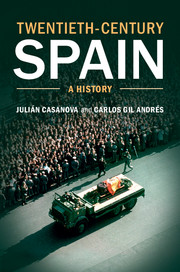Book contents
- Frontmatter
- Contents
- List of illustrations
- Key figures
- List of abbreviations
- Twentieth-century Spain timeline
- Maps
- Introduction
- Part I The monarchy of Alfonso XIII
- Part II The Second Republic
- Part III The Civil War
- Part IV Franco’s dictatorship
- 10 Franco’s peace
- 11 ‘The spiritual reserve of the world’
- 12 The death throes of Francoism
- Part V Transition and democracy
- Guide to further reading
- Index of names and authors
- References
11 - ‘The spiritual reserve of the world’
Published online by Cambridge University Press: 05 July 2014
- Frontmatter
- Contents
- List of illustrations
- Key figures
- List of abbreviations
- Twentieth-century Spain timeline
- Maps
- Introduction
- Part I The monarchy of Alfonso XIII
- Part II The Second Republic
- Part III The Civil War
- Part IV Franco’s dictatorship
- 10 Franco’s peace
- 11 ‘The spiritual reserve of the world’
- 12 The death throes of Francoism
- Part V Transition and democracy
- Guide to further reading
- Index of names and authors
- References
Summary
The Second World War was soon followed by the Cold War, the unarmed confrontation between the Soviet Union and the United States and their respective allies. Franco’s anti-communism found favour among the American military, a recognition embodied in the Madrid Pacts, signed on 26 September 1953, the point of departure for the significant economic and military aid that the United States was to give Spain over the following years.
One month previously, Franco’s government had managed to sign a new Concordat with the Vatican. Franco was keen to describe Spain as ‘one of the world’s great spiritual reserves’. With the military, American aid and the blessing of the Holy See, the dictatorship was in no danger. Those who employed armed resistance, the maquis or guerrillas, were doomed to failure almost before they started their struggle. The mechanism of the dictatorship’s power was stable despite undergoing major challenges at the beginning of the 1960s. Internal immigration, very important for the development of the Spanish economy, brought several million agricultural workers to the towns and cities during that decade. With the industrialisation and growth of the cities, the working classes recovered, or re-established, strike activity and their organisations, the two instruments of struggle that had been eliminated by the result of the Civil War. Hunger and poor working conditions gradually gave way to salaries improved by collective agreements and the demand for liberties. Change within order was the tonic during those golden years of Franco’s dictatorship.
- Type
- Chapter
- Information
- Twentieth-Century SpainA History, pp. 249 - 269Publisher: Cambridge University PressPrint publication year: 2014



